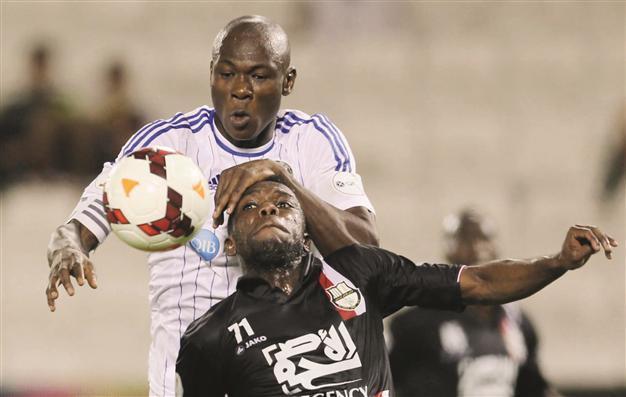Politics in Egypt football under FIFA spotlight
James M. DORSEY

Al-Sailiya’s Moumuli Dejano (L) fights for the ball with Al-Ahli’s Fred Dabanka during their Qatar’s Emir Cup semi-final soccer match in Doha May 10.
World football body FIFA has dispatched investigators to Egypt to investigate allegations of government interference, as the country prepares for potentially risky bids to host two international tournaments, the 2017 Beach Football World Cup and the 2018 FIFA Under-17 Women’s World Cup.
The FIFA investigation and the bids come against the background of a military coup that toppled Egypt’s first and only democratically elected president last year and a presidential election this month is likely to effectively cement the military’s grip on the country, which has been marred by a brutal crackdown on regime opponents and political freedoms in which more than 3,000 people have been killed, some 17,000 wounded and 19,000 detained. The investigation focuses on the government’s forcing of elections in March of presidents for Egypt’s two foremost clubs, storied Cairo arch rivals al-Ahli SC and al-Zamalek SC, whose militant supporters played a key role in toppling President Hosni Mubarak three years ago and the subsequent anti-military protests.
The elections were designed to ensure that the clubs were led by regime loyalists and block the prospects of candidates close to Gamal Mubarak, the imprisoned, neo-liberal son of the ousted president. Al-Ahli and al-Zamalek had resisted holding elections prior to the expected promulgation of a new sports law. FIFA decided to investigate after the Egyptian Football Association failed to satisfactorily reply to a demand by the football body.
Egypt’s bids for the two football tournaments constitute an effort to repair the country’s image badly tarnished by its abysmal human rights record. The bids could well backfire like in the case of the 2022 World Cup host Qatar that is under pressure to reform restrictive labor conditions and put Egypt’s repressive regime even more under the spotlight.
In Egypt, fans have been banned from attending matches for more than two years, initially to prevent further violence in the wake of a politically loaded brawl in Port Said in February 2012, in which 74 al-Ahli fans were killed. The ban has since last year’s coup against Mohammed Morsi, who is standing trial on multiple charges. FIFA has remained silent on the ban that has everything to do with survival of the Egyptian regime and curtailing expressions of dissent.
The struggle for who represents Asia in the FIFA executive committee is a case in point. Asian Football Confederation (AFC) president Sheikh Salman bin Ebrahim al-Khalifa, who also heads the Bahrain Football Association, was last year elected to clean up the scandal-ridden group after its former president, Mohammed bin Hammam, was banned for life from involvement in football on the grounds of alleged corruption. Instead, Sheikh Salman, a member of Bahrain’s ruling family, has spent his first year in office seeking to expand his power base at the expense of football governance’s few reformers, among whom first and foremost Jordan’s Prince Ali bin al-Hussein, whom Sheikh Salman in an undemocratic maneuver rather than a free and fair election, is seeking to replace as FIFA vice president. Prince Ali is one of the few international football executives who has used his position for the greater good of the game.
